
Usmar Ismail was an Indonesian film director, author, journalist and revolutionary of Minangkabau descent. He is widely regarded as the native Indonesian pioneer of the cinema of Indonesia.
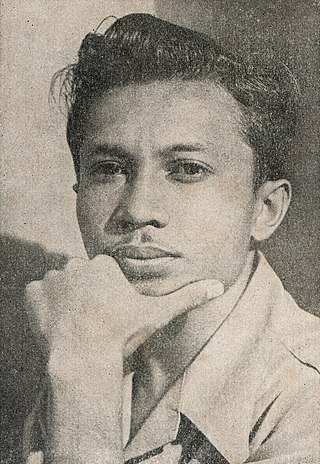
Asrul Sani was an Indonesian writer, poet and screenwriter.
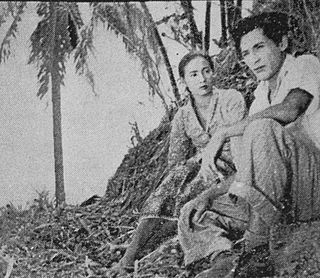
Embun is a 1952 film directed by D. Djajakusuma for Perfini in his directorial debut.

Tiger from Tjampa is an Indonesian black and white drama film released in 1953, produced by Perfini, written and directed by D. Djajakusuma. It is still highly regarded today in Indonesia as an early portrayal in a fiction film of aspects of a traditional regional culture. Despite the numerous combat scenes as well as scenes of students practicing pencak silat, Indonesia's traditional form of self-defence, based on the movements of animals and although in the film, the lessons are conducted by a famous master, Tiger from Tjampa was never presented as a martial arts film.

Lewat Djam Malam is a 1954 Indonesian film directed and produced by Usmar Ismail and written by Asrul Sani. Widely regarded as a classic of Indonesian cinema, the film follows an ex-soldier in his vigilante actions against corruption.

Raden Nganten Nurnaningsih was an Indonesian actress. She has been described as Indonesia's first sex bomb.

Djadoeg Djajakusuma was an Indonesian film director and promoter of traditional art forms. Born to a nobleman and his wife in Temanggung, Central Java, Djajakusuma became interested in the arts at a young age, choosing to pursue a career in theatre. During the Japanese occupation from 1943 to 1945 he was a translator and actor, and in the four-year national revolution which followed he worked for the military's educational division, several news agencies, and in drama.
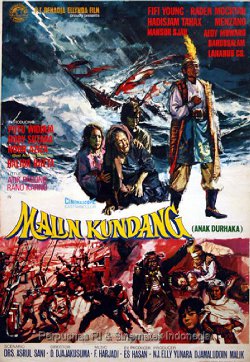
Malin Kundang (Anak Durhaka) (literally Malin Kundang, the Unfaithful Child]) is a 1971 film directed by D. Djajakusuma and adapted by Asrul Sani from the folktale of the same name. It follows a young boy who forgets his roots after spending much of his childhood at sea. Starring Rano Karno, Putu Wijaya, and Fifi Young.
Warriors for Freedom is a 1960 Indonesian drama film directed by Usmar Ismail. It was entered into the 2nd Moscow International Film Festival where Bambang Hermanto won the Silver Prize for Best Actor.

Darah dan Doa is a 1950 Indonesian war film directed and produced by Usmar Ismail, telling the story of the Siliwangi Division and its leader Captain Sudarto on a march to West Java. Following Ismail's Dutch-produced Tjitra (1949), Darah dan Doa is often cited as the first 'Indonesian' film, and the film's first day of shooting – 30 March – is celebrated in Indonesia as National Film Day.

Perfini was an Indonesian film production company, based in Jakarta. It was most productive in Indonesian cinema in the 1950s. Its most notable directors were Usmar Ismail, who directed its first film Darah dan Doa (1950), and D. Djajakusuma. By 1966 it reportedly had its own studio, a "20-by-30-meter building large enough for construction of a couple of modest sets".

Miecke Marie De Rijder was an Indonesian actress, model, and politician who won three Citra Awards. She was crowned the best female antagonist in Indonesian film industry along with Suzzanna and Ruth Pelupessy. Wijaya began her career as a teenager and soared to popularity by partaking a role in Usmar Ismail's commercially successful Tiga Dara, her name became increasingly popular after starring in the soap opera Losmen in 1987.
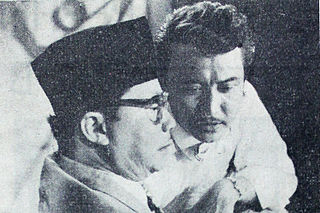
Tamu Agung is a 1955 Indonesian dramatic comedy film directed by Usmar Ismail. It stars Cassin Abbas, Nina Amora, M. Pandji Anom, and Chitra Dewi. The satirical political comedy, about the anticipation of the visit of a dignitary to a small isolated village in East Java, was critically acclaimed, although it was disliked by the government. The film, produced under the Perfini banner, was shot by cinematographer Max Tera. This movie is set in the modern day.

Boes Boestami was an Indonesian journalist and film actor. He was mostly known for his comedic roles.
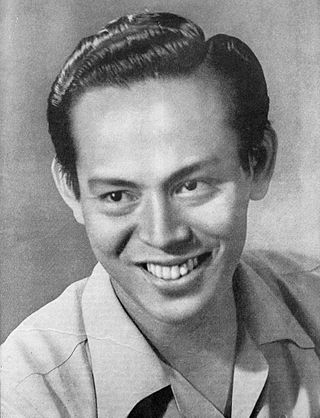
Raden Soekarno, better known as Rendra Karno, was an Indonesian actor. Born in Kutoarjo, Central Java, Soekarno entered the film industry in 1941, making his debut appearance in Union Films' Soeara Berbisa. Over the next forty years he appeared in more than fifty films. He was also involved in the theatre during the Japanese occupation of the Dutch East Indies and the Indonesian National Revolution. For his role in 1962's Bajangan di Waktu Fadjar, he was named best supporting actor at the 1963 Asian Film Festival in Tokyo.

Tiga Dara is a 1957 Indonesian musical drama film starring Chitra Dewi, Mieke Wijaya, and Indriati Iskak. Directed by Usmar Ismail for Perfini, the film follows three sisters who live with their father and grandmother. When the eldest sister, Nunung, shows no interest in marrying, her family tries unsuccessfully to find a husband for her. Nunung initially rejects the advances of a young man named Toto, who instead dates her younger sister. However, when he becomes jealous and travels from Jakarta to Bandung to profess his love, she agrees to marry him.

Indriati Gerald Bernardina, also known by her stage name Indriati Iskak and after marriage as Indri Makki, is an Indonesian actress turned psychologist and marketer. She entered the Indonesian film industry and soared to popularity with Usmar Ismail's commercially successful Tiga Dara (1957). She appeared in eight further films and established her own girl group before retiring from cinema in 1963. She graduated from the University of Indonesia with a degree in psychology in 1968, and has taught the subject at the Jakarta Art Institute. For twenty-six years she worked with Unilever, and since 1994 she has been a marketing consultant with Makki Makki.

Aminah Tjendrakasih was an Indonesian actress best known for her appearance as Lela in the television series Si Doel Anak Sekolahan. Beginning her career in her teenage years, Cendrakasih had her first starring role in 1955's Ibu dan Putri. She soared to popularity after taking a role in Serampang 12 along with Nun Zairina in 1956. Cendrakasih acted in more than a hundred feature films; in 2012 and 2013 she received Lifetime Achievement Awards from the Bandung Film Festival and the Indonesian Movie Awards.

The South Pacific Film Corporation (SPFC) was a Dutch government sponsored feature film producer in the Dutch West Indies. A separate unit produced newsreels in Indonesia. The production company was sponsored under the Netherlands Indies Civil Administration. It was preceded by the Netherlands Indies Government Information Service.

Amor dan Humor is a 1961 Indonesian drama film directed and produced by Usmar Ismail and Baby Huwae. It starred Huwae, Bambang Irawan, Rendra Karno, and Rima Melati.



















